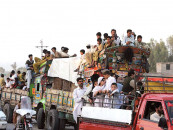Informal women workers : Legal rights demanded
Participants for proper implementation and awareness of laws

STOCK IMAGE
Women rights advocates, representatives of labour unions, and government officials called for carrying out a comprehensive survey on demographics of women working in informal sectors in order to ensure fair representation in legislation and policymaking.
They were speaking at the third women workers convention on Tuesday organised to discuss the role of stakeholders in implementation of legal rights for women workers.

Over 250 women working in formal and informal sectors participated in the event. It was jointly organised by Uks Research Resource and Publication Centre, USAID Gender Equity Programme and Aurat Foundation.
Saniya Jafree from Uks shared findings of a survey about working women in the twin cities. According to the results, 28 per cent of women in the formal sector reported an increase in their influence as a family member after they started working. She said 99 per cent were not well-aware of their legal rights, and were incapable of demanding them unless they were educated and informed.
As part of the research, working women leaders were chosen who formulated a charter of demand considering their issues and needs.
Rabia, a woman leader, highlighted that rules and regulations in the capital were still not allowing domestic workers to form a union, which should be facilitated. “We demand parliamentarians to formulate a plan so that our future at work can be saved,” she said. “Especially in the informal sector, certain restrictions should be there for firing us from work without a justified reason,” she added.
National Commission on the Status of Women Chairperson Khawar Mumtaz said more than 70 per cent women in the country either work from home or in the informal sector. “Part of the struggle involves being rightly informed and a detailed research on demographics of working women in informal sector, which is very important for policy making,” she said.
Senator Nuzhat Sadiq said that if we do not repeatedly talk about our issues, no one would be interested in solving them. She said Pakistan is a heavily legislated country, but laws need to be improved to exhibit better results. “Number of working women is increasing day by day and there is a need to change the mindset, especially among men, to facilitate them in working spaces,” she said.
Ministry of Law, Justice and Human Rights Additional Secretary Saqib Aleem said that by definition, rights defined for workers in the Constitution are applicable only for the time they are on the job, which excludes those who work informally. “It is more important that people be made well aware of already existing laws rather than working on new ones,” he said.
International Labour Organisation Senior Programme Officer Razi Mujtaba informed that first labour convention was ratified in 1919 and today there are 189 conventions on rights of workers. “Pakistan has not yet ratified a convention about domestic workers,” he added.

He said labour unions for domestic workers have only been allowed by provincial governments of Punjab and Sindh while other governments including federal are still lagging behind. Defining rights of workers, Mujtaba said “Unions should work to ensure decent work environment which means wages should be enough to spend life in a respectable manner.”
“As labourers and workers we need to realise our importance in economy and demand our rights accordingly,” said Zahida Parveen from the Pakistan Workers’ Federation.
Published in The Express Tribune, October 1st, 2015.



















COMMENTS
Comments are moderated and generally will be posted if they are on-topic and not abusive.
For more information, please see our Comments FAQ